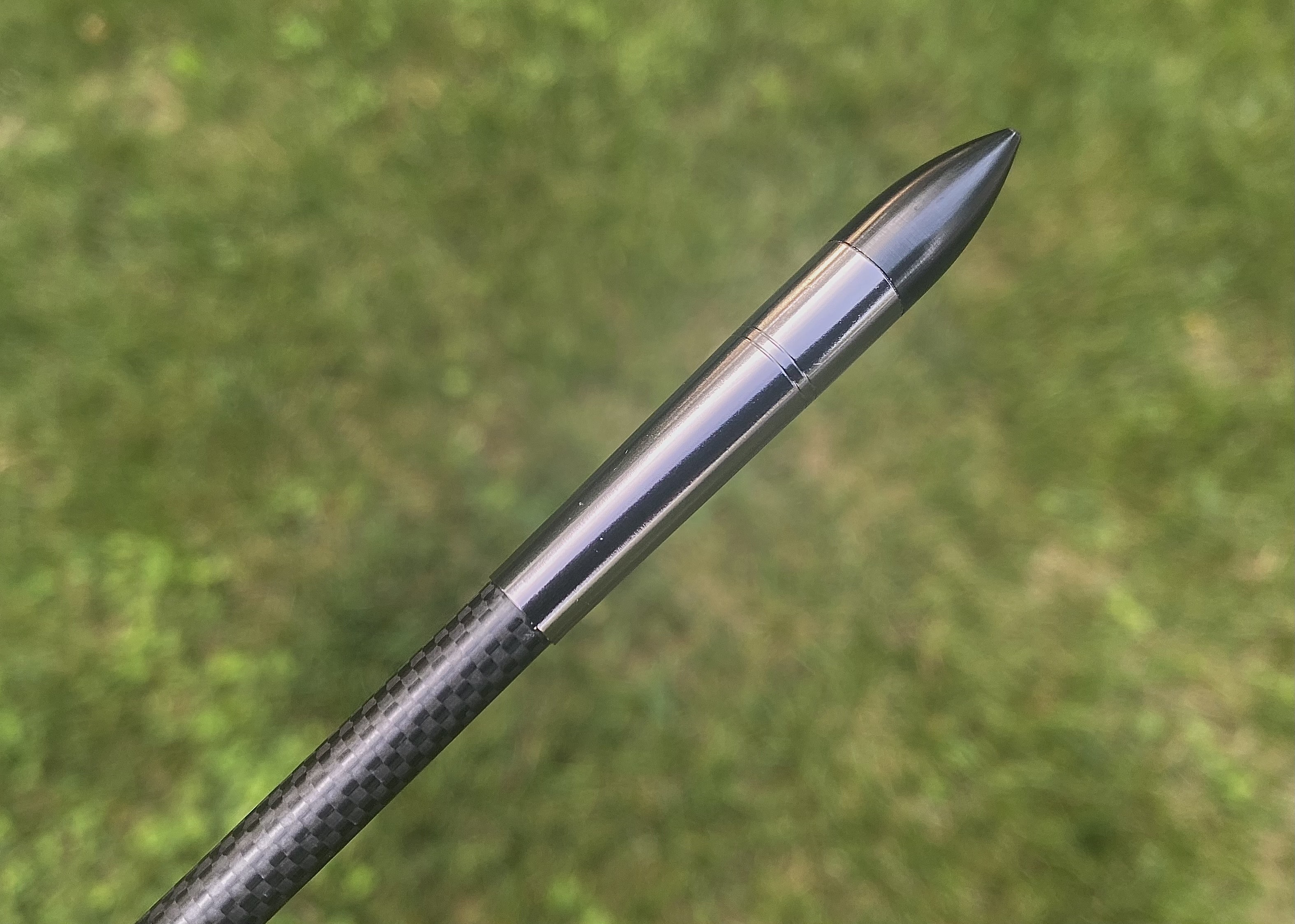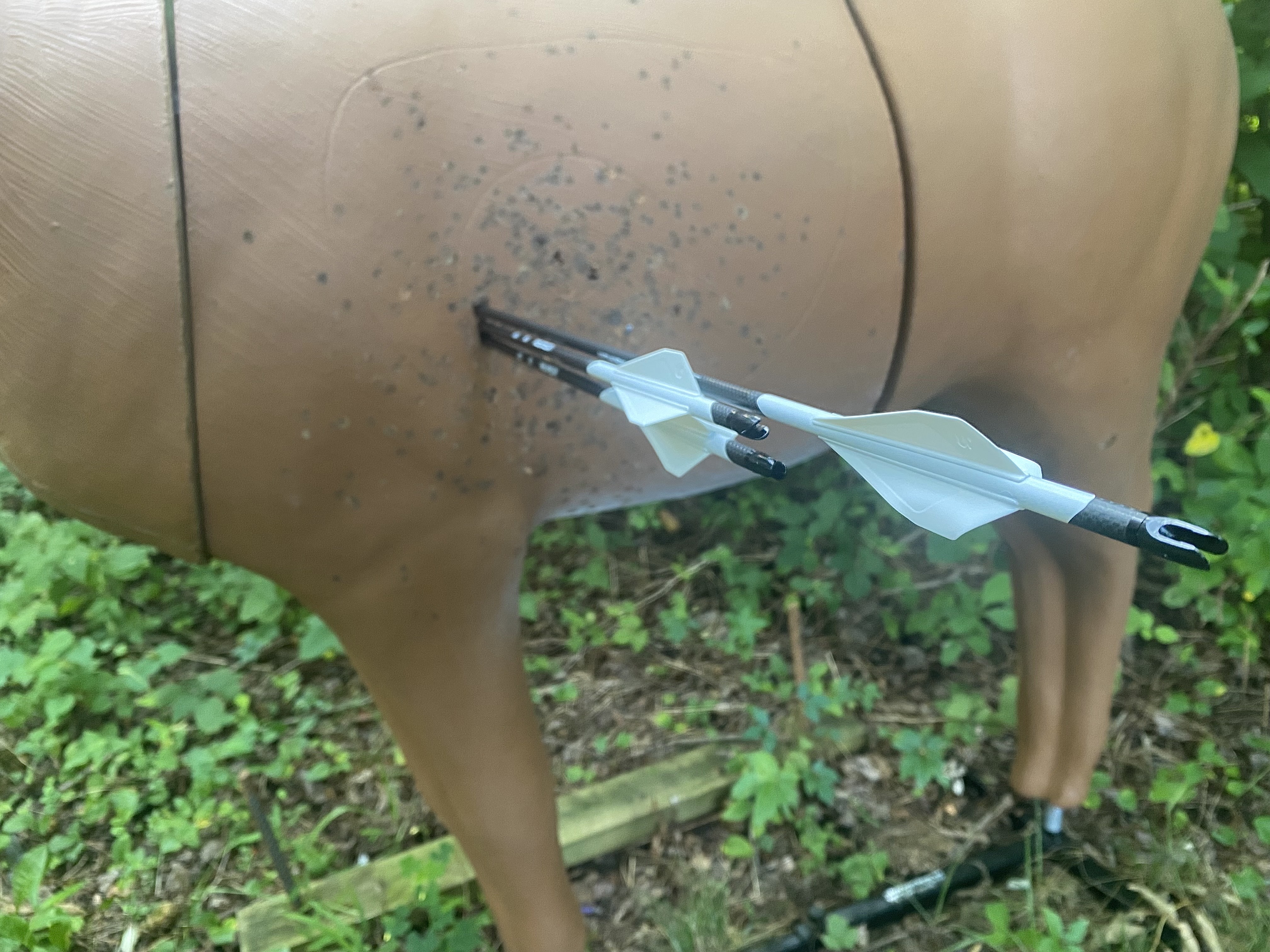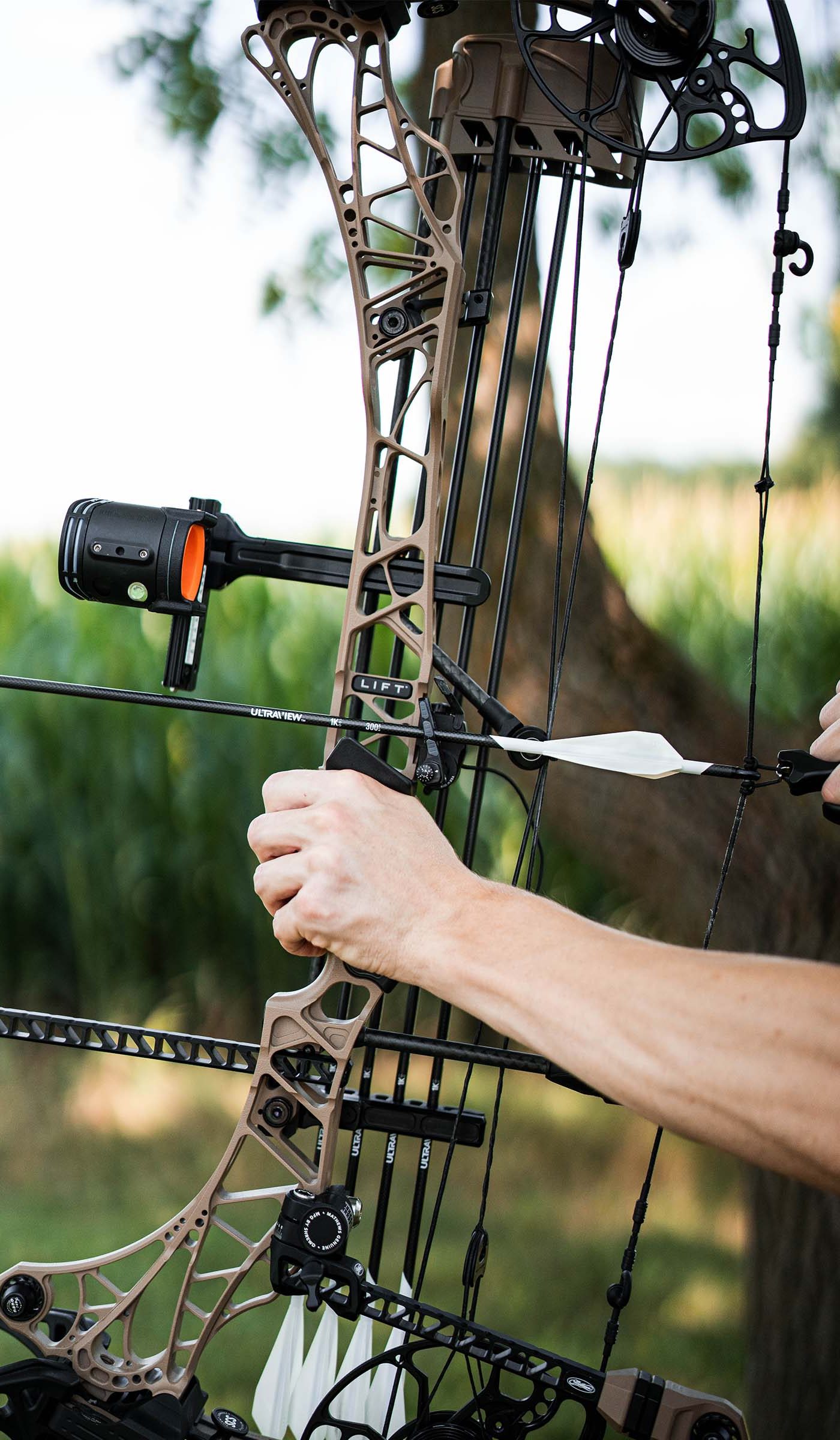We may earn revenue from the products available on this page and participate in affiliate programs. Learn More ›
Ultraview Archery entered the arrow market today with a hunting arrow that’s a size no one else is making and utilizes a type of carbon no one is using. Why would a company that’s known for its archery accessories do such a thing?
“We wanted to cut the noise,” says UltraView CEO, Kolby Hanley.
“Cut the noise” is the tagline of the all-new UV 1K arrow. And no, the tagline isn’t meant to suggest that this arrow is quiet – although it is. It expresses UltraView’s desire to provide an arrow that’s simple and reduces the complexity of arrow building.
You don’t have to worry about shaft size, vanes, nocks, inserts, and you don’t have to decide which of the dozens of options are best for you.
“With the UV 1K, you grab a pack, and all you have to do is cut the shafts to length and glue in the included inserts,” Hanley says. “And you can know that you are choosing an arrow that was designed from nock to point for maximum performance as a complete unit.”
It was over a year ago that UltraView forged a partnership with longtime carbon arrow maker Victory Archery to create an arrow designed by UltraView’s team of engineers and self-proclaimed archery nerds, which will be built by Victory’s experienced hands. The UV 1K is a 4.5mm arrow made of 1K carbon that comes complete with a unique wrap, custom injection-molded vanes, a 75-grain insert/outsert, and a PVD-coated field point. Of course, you’ll have to pay a princely sum for all of these features, but we’ll get to that later.
I’ve been testing this complete hunting arrow system for the past few days and I recently interviewed UltraViews CEO, here’s what I found out.
- Spines: 250, 300, 350
- Weights (GPI): 250, 10.0; 300, 8.7; 350, 8.0
- Insert/Outsert Weight: 75 grains
- White fletching and wrap (no other colors available)
- Points: 100 grains
- Vanes: 2 13/16 inches long
- Tested Arrow Weight: 468.6 grains (300-spine, 30-inch arrow)
4.5mm Diameter
Photo by UltraView
UltraView didn’t want to offer 5mm and 4mm options. They wanted one arrow, and the perfect choice was a blend of those two popular sizes. Hanley says his team likes how a 4mm shaft cuts through wind and offers superior penetration, but they wanted to keep the overall weight down without sacrificing durability.
Though 4mm arrows have smaller diameters than 5mms, they have thicker walls to make them durable, which often results in weights close to 5mm arrows . For example, a 300-spine Easton Axis 4mm weighs 9.3 gpi, and a 5mm Axis with the same spine weighs 10.7 gpi. The UV 1K 300 spine is lighter than both and weighs 8.7 gpi thanks to its 1K carbon construction.
1K Carbon
When Hanley went to Victory to build his arrow, he asked company officials for the best carbon for arrow shafts. They came back with 1K, which is a carbon weave made of 1,000 fibers per tow. A tow is a carbon bundle, which is the basic element used to produce a carbon weave. Victory makes arrows from 3K carbon, but the 1K is lighter. It’s commonly used in the aerospace and automotive industries. It’s also harder to source and more expensive than other carbon weaves, according to Hanley. Those reasons undoubtedly cause the household-name arrow makers to steer clear of it.
UltraView was undeterred by the 1K issues. Hanley says his team is working many months ahead to ensure there’s enough 1K carbon heading to Victory to build the needed number of 1K arrows.
“We wanted the best, and so we knew there would be extra things we’d have to deal with,” he says.
What UltraView discovered in their testing is that 4.5mm arrows built from 1K carbon are super straight, pretty light and super strong — all traits they wanted in their arrow. In building the 1K arrows, Victory covers each with its ICE coating. This is a slick outer shell that’s designed to improve penetration. More importantly in my opinion, it also makes these arrows much easier to pull out of foam targets than uncoated arrows.
Spine Aligned
Victory spine aligns every arrow. There’s an indicator line on each arrow identifying the stiffest spot running the length of the arrow. Most archers agree that for the greatest consistency in accuracy, the stiffest spine of an arrow should face straight up when the arrow is nocked. So as Victory workers hand wrap and fletch each arrow, the fletchings and nocks are positioned so that stiffest spine is pointing up.
Injection Molded Fletching

Photo by P.J. Reilly
Speaking of the fletchings, the 1K vanes are injection-molded, as opposed to the more common manufacturing process of stamping ribbons of material to cut vanes out. Through injection molding, UltraView is able to create areas of different thicknesses in individual vanes. They rounded certain edges and added texture. All of this was done in the name of aerodynamics. Hanley says his team designed, built and tested dozens of vanes to come up with one that offers superior steering for a 4.5mm shaft carrying a broadhead.
Insert and Point

Photo by P.J. Reilly
At the front of the arrow, UltraView chose an insert/outsert that’s similar to those already made by Victory, although the one that fits the 4.5mm UV 1K is a unique size. The component features a strong, stainless steel insert that’s married to an aluminum outsert, offering protection for the end of the carbon shaft.
UltraView includes a PVD-coated, 100-grain field point, with an O-ring in the ferrule to keep the point from coming loose. The coating keeps the points from rusting and scarring through use and abuse.
Nock
The UV 1K comes from the factory with an AAE IP nock, size 4. Although the shaft is 4.5mm, a collar between the nock and the shaft necks down the rear hole to 4mm, which is what the size 4 IP nock fits. I can also verify that the Beiter .166 Hunter nock fits as well. For bowhunters who like lighted nocks, UltraView recommends the Halo Micro Lighted Nock.
Price
In the arrow world, the UV 1K is expensive. They’re currently selling for right around $220 per six pack. On the Lancaster Archery Supply website, there’s only one hunting arrow that costs more than that — the TAC LRP, which also is a complete arrow system, although it was assembled using a shaft and components that already existed and can be bought separately.
No doubt the UV 1K’s sticker price is going to cause some shock. Hanley knows that. He says it’s not for everyone.
“This is for the bowhunter who doesn’t want to go through the process of trying to build the perfect arrow himself, while figuring out what components work together,” he says. “This is for the guy who says, ‘Just give me the best.’”
Replacing componentry with UV 1K parts won’t be cheap or simple either. The only parts UltraView currently plans to sell are vanes and wraps that will only come in refletching “kits.” UltravView plans to package sets of enough vanes and wraps together to re-wrap and refletch six arrows. That’s what you must buy to repair damaged 1K arrows with 1K parts. There are no plans to sell the inserts or points separately.
Of course, you can wrap and fletch the UV 1K with any wrap or vane you want, although the wrap fit will be a bit off, since no one else currently makes a wrap intended to fit a 4.5mm arrow. But using different fletching kind of defeats the purpose of the 1K arrow.
Read Next: The Best Hunting Arrows
Testing UltraView 1K Arrows

Photo by P.J. Review
You can tell the UV 1K is different even before you see the arrow. The box it comes in is nicer and more durable than any other arrow box on the shelf. That’s intentional. The box is meant to double as an arrow case to hold your arrows safe and secure in foam beds as you transport them from home to the range or even to hunting camp. When you do get hold of the arrow, it’s a beautiful piece of gear. It looks nice. It feels nice. There are no flaws.
I tested a six-pack of 300-spine UV 1K arrows, shot from a couple different, 70-pound bows. At my desired length of a hair over 30 inches, each completed arrow weighed 468.6 grains. UltraView says the arrows are sorted at the factory to be within a half grain of one another.
Hanley says his team tried to understand how much a half a grain is.
“Is it an ant? Is it a grain of rice? What is it?”
They determined half of a grain of rice weighs about a half grain.
The six arrows in my set, when finally built, all were within that half-grain tolerance. In essence, they all weighed exactly the same, which is important for consistent archery accuracy.

Photo by UltraView
The arrows shot lights out. I wish I could give you information on group sizes, but the first time I shot the arrows at 30 yards, I nearly Robin-hooded one. I broke the nock and dinged the nock collar. The collar damage wasn’t grave, and I had a replacement nock to keep the arrow in my quiver, but I decided right there I wasn’t going to shoot these at the same spot anymore.
Three things struck me about the UV 1K. First was how quiet they are. We built a narrow shooting range at the warehouse facility where I work that has a cinderblock wall on one side and plywood on the other, with a high ceiling. It’s quite the echo chamber, and I can hear arrow noise when I shoot there. The first shot I took with a UV 1K, the silence struck me. It was quite noticeable. That’s certainly not a scientific test, but I could detect a noise difference between this arrow and my usual hunting arrows.
The second thing I noticed was the arrow tracking at distance. My bows are always tuned to perfection. My shooting form, on the other hand, is anything but perfect. When I shoot at distance, I almost always periodically notice an arrow that has some wiggle in flight. It’s not much, and in 15 shots, it might happen once or twice. That’s me torquing the bow.
As I write this, having shot the UV 1Ks over four days, I have yet to see that wiggle. And with white fletchings and white vanes on the UV 1K, if the wiggle were there, I’d see it.
Hanley says one of the benefits of the 4.5mm arrow made of 1K carbon is it recovers fast. As mentioned, arrows flex when they leave a bow. The faster they can straighten, the faster they can get on track toward the aiming spot. That results in tighter groups down range.
If your bow is tuned perfectly and you have perfect form, capable of producing the same arrow flight out of the bow with each shot, arrow recovery time isn’t quite as important as it is when those two things are not perfect. I’m sure I torqued my bow on some of the shots I took with the UV 1K arrows. My guess is the arrows corrected before I could see that wiggle. All I know is, every 1K arrow I shot during testing looked like a white laser beam going down range.
The third thing I noticed about the UV 1K is something I notice with all Victory arrows that have that ICE coating. They pull out of foam targets exponentially easier than other carbon arrows. That just makes shooting on the range a bit more enjoyable.
Read Next: Best Archery Targets
Final Thoughts on the UltraView 1K Arrows
Are they worth $220 a six pack? That’s a personal choice, quite frankly. There’s no question the UV 1K is a unique, quality arrow, built with attention to detail, which performs at a high level. This isn’t a cheap arrow carrying a steep price tag just because of the name that’s on it. Time will tell if bowhunters believe the juice is worth the squeeze that’s required to take home the UV 1K.
One thing is for sure, you can’t discount UltraView’s ability to convince bowhunters and archers to part with their money. Remember the social media reactions when UltraView launched the UV Slider sight at $600?
“That’s a ridiculous price!”
“They’re crazy! They’ll never sell any!”
Now go to a Total Archery Challenge event and see all the UV Sliders on the mountain. Sales of that sight are doing just fine. Don’t be surprised if the UV 1K follows suit.
